Connor Swindells Q&A: ‘SAS Rogue Heroes‘ Star Shows His Mettle In Steven Knight’s BBC WW2 Desert Drama
- Oops!Something went wrong.Please try again later.
- Oops!Something went wrong.Please try again later.
- Oops!Something went wrong.Please try again later.
- Oops!Something went wrong.Please try again later.
- Oops!Something went wrong.Please try again later.
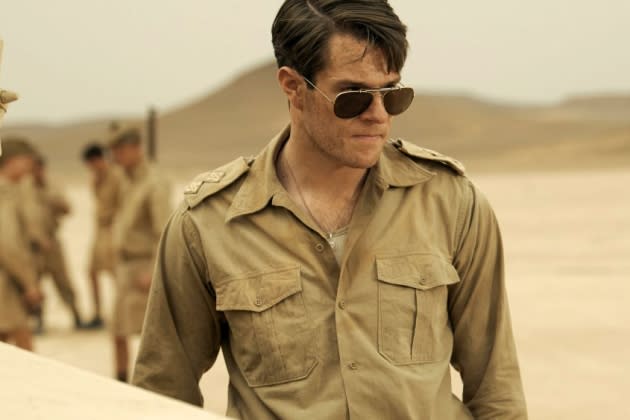
EXCLUSIVE: Sex Education’s Connor Swindells said he felt privileged to land the lead role in the stonking BBC One WW2 desert warfare drama SAS Rogue Heroes, and he praised director, Tom Shankland (The Serpent) “for considering me for this, because this isn’t something that comes my way.”
The six-part drama, written and created by Peaky Blinders’ Steven Knight and from Kudos, is based on Ben Macintyre’s 2016 bestselling authorized wartime history of the SAS.
More from Deadline
'Great Expectations': FX & BBC Cast Tom Sweet In Young Pip Role
'Pennyworth' Creator On DC Drama's Move From Epix To HBO Max: "Platforms Matter"
Swindells, proudly working-class, said that he was apprehensive about auditioning for the part of David Archibald Stirling, a Scots Guard officer and scion of a grand Scottish family with bloodlines stretching back on his mother’s side to King Charles II, and son of a WW1-decorated army general.
“I hadn’t been in those conversations for these types of roles, and it was really Tom Shankland that championed me so much. He really fought for me and I’m really grateful to him for that,” the actor told us over cups of tea — it was a rainy evening — in the Soho district of London recently.
Swindells fit Shankland’s idea of the portrayal of Stirling: the man with a taste for extreme adventure who, in the summer of 1941, came up with a plan that broke all the rules. This was to establish an undercover unit that would parachute behind enemy lines in the Western Desert – a vast expanse of sand between Egypt and Libya – to inflict maximum mayhem.
Stirling was a mad man with a mad plan. Macintyre’s book recounted a tale that General Bernard Montgomery, at the time Commander-In-Chief of the western desert campaign, told fellow officers: ”The Boy Stirling is mad. Quite, quite mad. However, in war there’s often a place for mad people.”
Swindells told us that he hadn’t worked with Shankland before “but it was all down to him that I was even seen.”
Asked if casting directors used to index him by class, Swindells’ response was “for sure.”
However, he said: “I’ve always been given the opportunity to break out of that. I can’t actually sit here and complain that I had 10 years of trying to get a role like this, because I’d be lying.”
Director Shankland and producer Stephen Smallwood loaded up a chartered plane with cast, department heads and crew and headed to the Sahara desert town of Erfoud in Morocco. Shooting during Covid, there were no weekend breaks back to Britain.
Main castmates include Jack O’Connell (Lady Chatterley’s Lover) as Paddy Mayne, another legendary figure from the earliest days of the SAS. He and Stirling were recklessly competitive; Alfie Allen (Game of Thrones) as Lieutenant Jock Lewes, straight-laced commando and brilliant tactician who attempted to bring order to some of Stirling’s more madcap military schemes; Dominic West (The Crown) as top British spy Lieutenant Colonel Wrangel Clarke and Sofia Boutella (Kingsman: The Secret Service) as Eve, the local French spy chief.
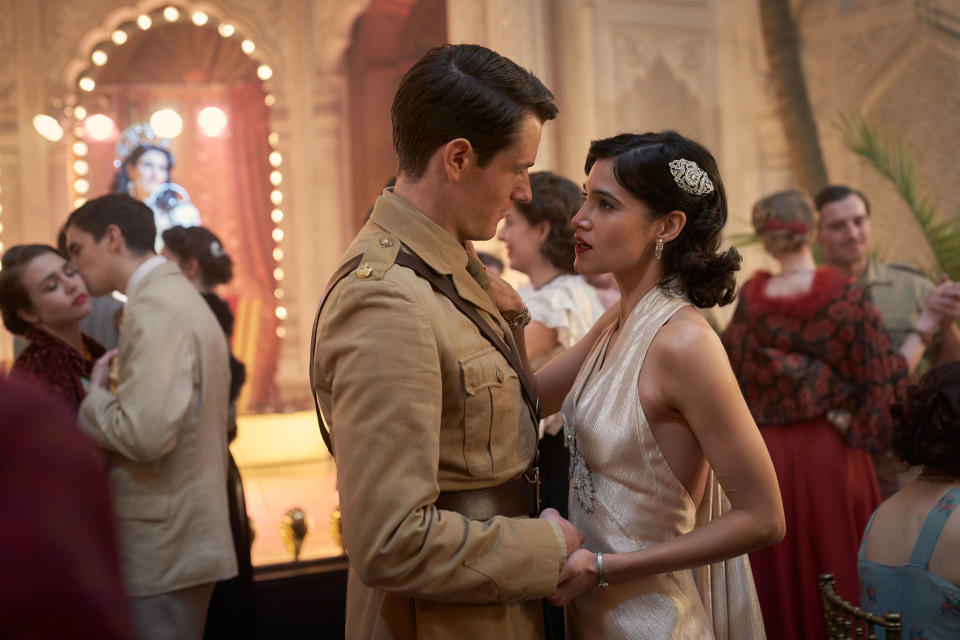
Although there were complaints about the scorpions, sand camels and the blasted heat, the cast saw it as a rare opportunity to rough it out on a faraway location in an age when any part of the planet can be recreated in a studio using CGI.
Swindells noted a comment that castmate Jack O’Connell (Lady Chatterley’s Lover) made when everyone was bellyaching about life in the desert. “Jack said: ‘Listen. If we were in Pinewood we’d be hating it.'”
Swindells has had a winning three-season run in Sex Education, the Netflix comedy created by Laurie Nunn, playing Adam Groff, the school bully-turned-love-interest of Ncuti Gatwa’s Eric Effiong. A fourth season with show regulars Asa Butterfield and Gillian Anderson is being shot now.
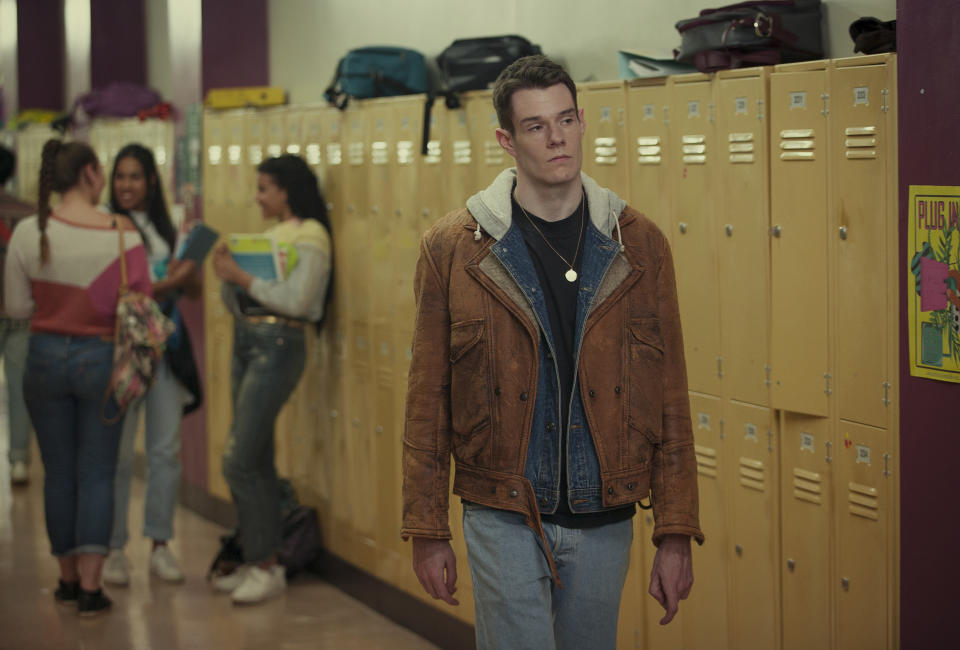
The 26-year-old has also appeared in TV series Vigil and has a role in director Greta Gerwig’s Barbie, which stars Margot Robbie and Ryan Gosling.
Swindell’s undeniably a star. He should have a cup of tea with Barbara Broccoli and Michael G. Wilson over at Eon Productions.
SAS Rogue Heroes begins on BBC One Sunday, October 30, with all episodes then available on BBC iPlayer.
Epix has the series in the U.S., having acquired it from Banijay Rights. It will air in the states from November 13.
DEADLINE: I’d read Ben MacIntyre’s book back in the day, and I’d done some research ‘cause I love all this stuff: so I had this vision of David Stirling in my head and I have to say that you fitted my sense of him, perfectly. Had you read Macintyre’s book before you saw the script?
SWINDELLS: I didn’t know anything about the history or the story before it came knocking. Originally, I wanted to play Jock Lewes and I’d asked to read for Jock, which I did. And then they came back and said, please would you read for this other part instead. It was quite daunting really. I’d never played anyone that was a real person in history before, especially someone of that standard. There was a real level of responsibility to do it right.
But ultimately it was the scripts. The scripts were great. Originally, when I’d heard of it, I think I thought the title sounded a bit naff. I thought, oh, what’s this going to be? And then immediately I read the first script and I thought, oh, God, it’s amazing. And Steven Knight’s dialogue, as you know, is amazing, and each scene is like an actor’s dream, because it’s basically 15 to 20 minutes of uninterrupted space to just do these great, long, amazing scenes that just flow like poetry, so you just get to really exist in that world.
It’s an experience I was nervous about and excited for as well.
DEADLINE: I think you have pulled it off, in my view. My sense of David Archibald Stirling is that he’s a rogue himself. He doesn’t fit into that aristocratic mould, essentially, so he wants to do his own form of derring-do. In the book General Montgomery said that Stirling was as mad as hell, but that you need mad people in times of war.
SWINDELLS: Absolutely, yeah. There’s a lot of stuff that the show doesn’t touch on about his backstory. He was someone who was striving for an identity and he was trying everything. At one point he was a cowboy in Colorado, and then he was a painter in Paris. He was searching for a place, and for adventure and excitement. I think when the war came it was hard to imagine what it was like, but obviously, everyone was pitching to jump in and he thought, well, maybe this is my time to make my mark. The craziness of it all was what probably enticed him.
DEADLINE: He runs towards danger.
SWINDELLS: He does, I suppose, until he doesn’t. He assumes that he has some sort of invincibility complex almost like a teenager does until they suddenly get to their late twenties and thirties, and they suddenly realise that it’s not a dress rehearsal and they’re not going to figure out immortality. But he really has that sort of like brutal arrogance about him. And a real self-serving, egotistical animal within him that sort of propels this machine into motion, and thank God he had it, I suppose. But the tragic thing about it, is that it’s maybe the working-class man in me that finds it that way, and that it needed someone of that calibre to get all these other guys together and to do something so grave. Maybe that’s my own frustration and the frustration of Paddy Mayne… that’s the reality, that they really push and pull against each other. That’s their love story, in a way.
DEADLINE: Interesting that you bring up the class issue. I was thinking that had the role been played by someone born into the upper class, I don’t think they would have captured, as you have, that animalistic sense of him.
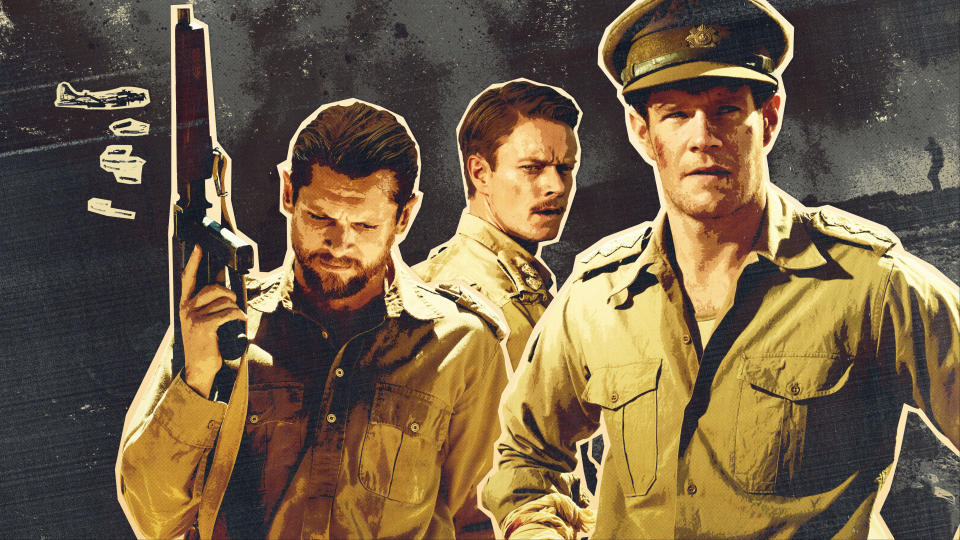
SWINDELLS: I appreciate that. Hopefully you’re right. First of all, I felt so privileged that this was something that even came my way because up until now it hadn’t been. I hadn’t been in those conversations for these types of roles, and it was really Tom Shankland that championed me so much. He really fought for me and, God, I’m so grateful to him for that.
DEADLINE: Had you worked with him before?
SWINDELLS: I hadn’t worked with him before, no. But it was all down to him that I was even seen. It was the first thing I said to him, even before I got the part: “Thank you for considering me for this because this isn’t something that comes my way.”
DEADLINE: I’m interested to hear you say that. Is it a class thing? Do casting people put you into certain compartments, do you think?
SWINDELLS: For sure. I definitely think… I don’t know. I think it would be an easy way of saying, ‘Oh, well it must just be a class thing.’
Maybe that’s the easy way out. It’s easy to see actors as just two dimensional. And thankfully, I’ve always been given an opportunity to break out of that. I can’t actually sit here and complain that I had 10 years of trying to get a role like this, because I’d be lying. I suppose it’s my own chip on my shoulder from being working class and maybe it’s my own corner that I put myself in, rather than the industry putting me into one.
DEADLINE: Did you go to drama school? [He shakes his head]. You started acting at school and were discovered by your drama teacher…
SWINDELLS: I did a little bit of drama in school and then I was a boxer and then after I stopped boxing, when I was nearly eighteen, I just started taking some acting classes in Brighton and I got seen there…[he is interrupted when tea is delivered to our banquette.]
DEADLINE: What was the thing, the spark, that kicked off your career from there?
SWINDELLS: I was working with my brother building fences which was really hard. You were just basically digging holes every single day. Wooden fences, sometimes concrete, whatever. I was not cut out for hard labour. But also I’d lost interest in boxing and I did terribly at school. And, I don’t know, for whatever reason I gained some audacity to toss my hat in the ring of acting. Perhaps, because I’d been a boxer, and there’s probably a certain bravery that comes with getting your head kicked in front of all your friends and family and going, well if I’ve done that, what have I got to lose? And having that mentality then got me my first roles.
DEADLINE: Talk to me about the making of SAS Rogue Heroes. Were you in the Sahara, or was it made over in Spain?
SWINDELLS: We were in the Sahara, over in North Africa and it was raucous. It was sandstorms everyday at two o’clock in the afternoon on the dot for four hours and we’d all just hide in our trailers, if we were lucky. Otherwise, we’d just be on set with goggles and masks on. The heat was unbearable, it was fifty degrees [celsius] everyday.
DEADLINE: Flies?
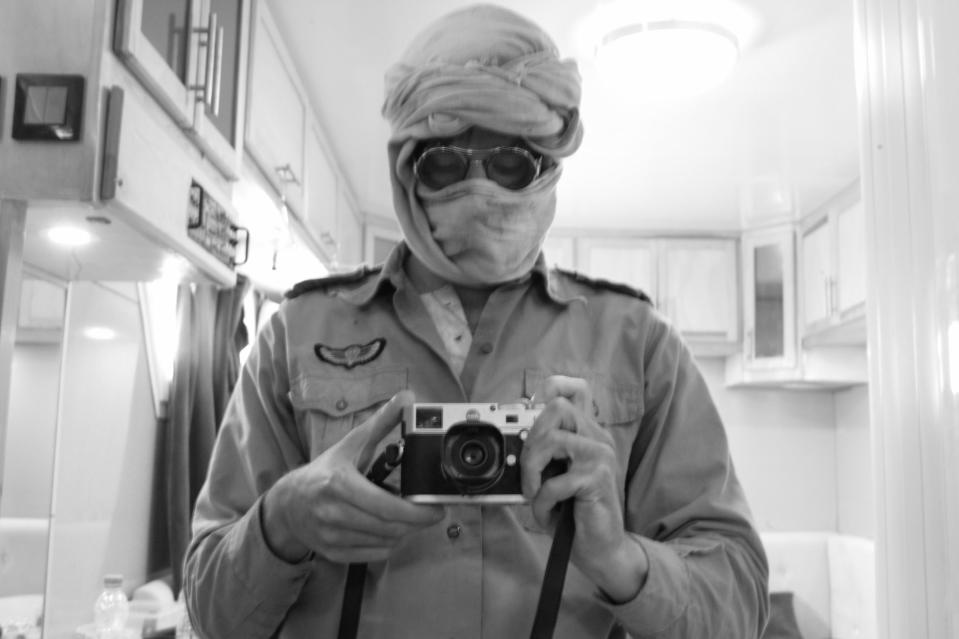
SWINDELLS: No flies but snakes and spiders. We had heatstroke… it was everything. I say all this and it was nothing compared to what the real guys went through but for a bunch of actors it was pretty hardy. I look back now and I miss it, obviously. We would have these amazing moments that I’m not quite sure I’ll ever get again. I see now that maybe they could’ve just chucked a load of sand on the floor and put up a couple of tents and a green screen. Had they done so we would have missed out on so much; we would have been kicking ourselves. Jack O’Connell said that to me when we were all having a hard time: “Listen, if we were in Pinewood we’d be hating it.” And I think he’s probably right because it added another layer. The desert in itself was such a character in that story, it really is.
DEADLINE: There’s an immediate built-in authenticity.
SWINDELLS: Absolutely. We were going across the flats in these genuinely WW2 jeeps that were falling apart at the seams. You couldn’t see the camera, we were just existing in that moment. There were no extras in the background miming… it was just the roar of the engine and you, and driving, and you felt — more so than I have in any other job — a real connection to the time, and the material and the person you were playing, in a way I’m not sure I’ll ever get again.
But, it was bloody hard.
DEADLINE: Interesting that you mentioned Jack O’Connell’s comment about being in a studio… I just saw some footage from a movie due out next year that’s set here, there and everywhere, but they didn’t leave the studio.
SWINDELLS: That’s the stuff you dream of doing in this industry. We shot it in 2021. We were in the height of Covid. We all had to jump on a charter plane and fly out to south western Morocco and then we drove about two hours just straight into the desert. Again it was amazing, and I miss it now. And the bonding that we all shared as actors, we really lived as those characters. Every night we were playing poker and every night we were telling stories. There was nothing else to do.
DEADLINE: Were there nights out or were you all confined to the desert?
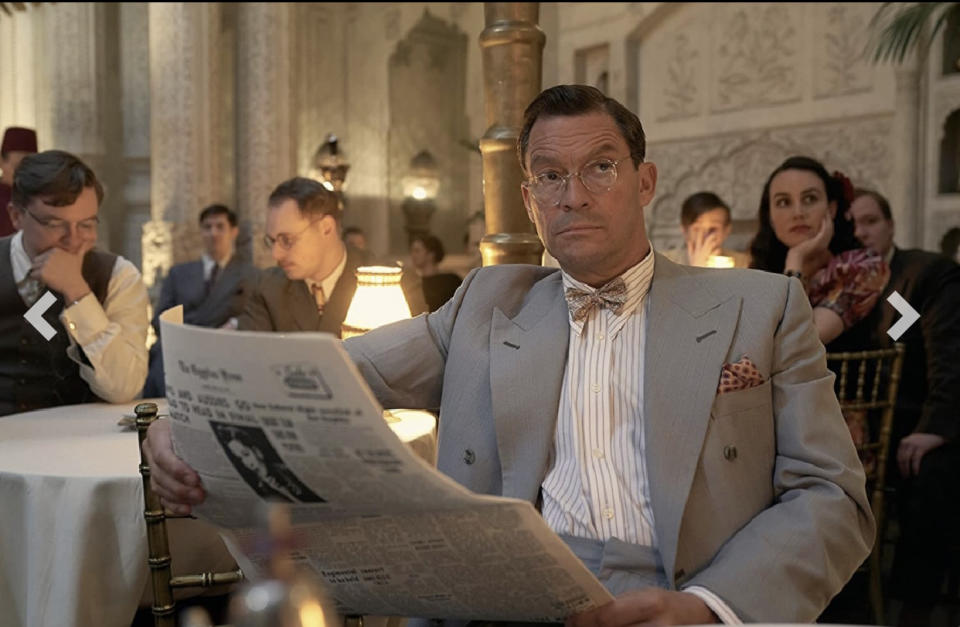
SWINDELLS: There was nothing. We had to entertain ourselves, and we did and it was great.
DEADLINE: But as you said, those days are going and it’s kinda sad because I love going on film location, and I’ve been in a few great ones in my time. These days I get invited to watch films and TV shows being shot in vast warehouses. I love doing that, by the way. But it’s not the same as observing on an actual location whether it’s a village green in merry England or an old jail in East Berlin.
SWINDELLS: I also enjoy doing that as well, it’s great fun. But being in the middle of nowhere and being just able to just really trick your brain into believing you’re that person, in that moment, it’s such a gift. And I think it really shows in the product, in everyone, because everyone is so brilliant in it.
DEADLINE: Very much so. I love that scene in one of the early episodes where you’re with Sofia Boutella in a bar. Neither of you are saying what you need to say but it all emerges anyway…
SWINDELLS: Stirling was a man who’d put up so many walls around himself, as all men did in that time, especially those who were called up. And he had built this fortress around himself that was near impenetrable, until it wasn’t. And when it wasn’t, it was his men that felt the brunt of it. It was rash decision making in crisis that cost a lot of real people their lives. I think he lived with a great deal of guilt for the rest of his life. The show doesn’t get into that, but from what I’ve read he was never quite the same, as I’m sure that’s not surprising.
DEADLINE: It’s tricky portraying real people, isn’t it?
SWINDELLS: It’s mostly true this story. Of course, Steven Knight had to make alterations with some things just because… maybe in real life they had 100 jeeps and in the show we only had 10, or whatever it was. It’s hard to source 100 jeeps from 1940. It’s mostly true and the spirit of the characters is all there. You can find footage of these guys out there but none of us did impersonations, we just did kind of spiritual embodiments of these rogue personalities that led that amazing challenge and created, what is today, the most effective special forces services in the world.
DEADLINE: That reminds me to ask about training.
SWINDELLS: I did a bit here [in the UK], and a bit over there… but I started filming before everyone else just because of locations that we needed. Most of the other guys did the kind of boot camp stuff but when we got to Morocco we had two weeks of quarantine time where we would do desert hikes and team-building exercises and things like that. It was fantastic.
DEADLINE: How long were the hikes? Like hours into the desert?
SWINDELLS: No they weren’t. You’d be really fried. Six o’clock in the morning it’s 35 degrees outside. It’s red raw. Especially for ones with fair complexion.
DEADLINE: Poor, pale boys.
SWINDELLS: Ha, I know. But it was such an amazing experience I can’t really complain about it, even though I did. All of us did.
There was a doctor that just kept making rounds. He would walk from one person’s trailer to another because someone’s arse was going like a tap. Then he’d come and see me…
DEADLINE: Sorry about laughing. Was it the food?
SWINDELLS: It must have been. The water as well, I suppose. We all lived through what the characters went through with the dysentery, and so on. As you say, we were there.
DEADLINE: But you didn’t have to drink rusty water from a gas canister?
SWINDELLS: No. God no.
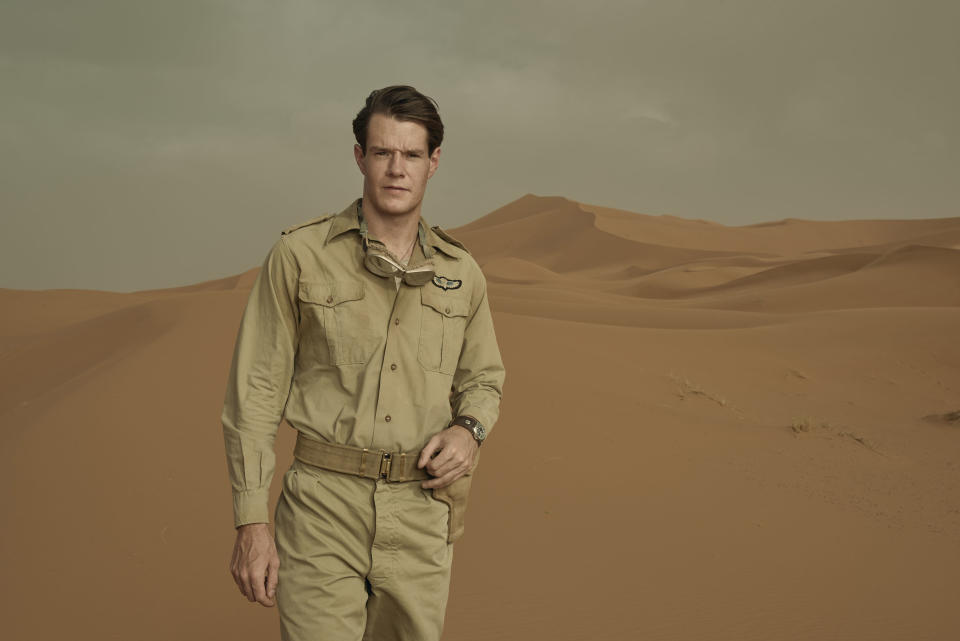
DEADLINE: Or your own urine, as some of the real chaps had to?
SWINDELLS: No, no! God, no! Although, I’m sure some did. They were those type of guys.
DEADLINE: Stirling’s almost destructively competitive, there’s a sense of that in the earlier episodes. He and Paddy [Mayne] are at each other’s throats in Ben Macintyre’s telling of it.
SWINDELLS: That’s what causes most of the the trouble. It’s this crazy sort of self-serving, selfish, narcissistic, egotistical need to be the top man… and when he feels his grip loosening, and he tries to tighten it even more, it’s like… I suppose the metaphor is perfect given where it’s set, but it’s like he’s trying to grip onto sand. And the more he grips onto it, the more he falls. But all he really needs to do is hold his hand out flat and let it sit on his hand. But he can’t figure that out. And other people in the regiment do figure that out and it drives them crazy. It causes even more trouble. I think that the men start to see that and they start to question if this is the right thing to be doing from a moral standpoint.
He has this charm about him, this devilish charm of being able to just get people onside. If that’s him limping all the way through GHQ and then somehow getting into the general’s office and convincing the general to sign off on this thing because his daddy was this and was that… he just had this entitlement that drove people crazy but they loved it. And he knew it, and he used it. Thank God he did. It needed someone like that to be so brazen.
DEADLINE: What does that tell us about men and war?
SWINDELLS: Someone asked me the other day what I think about masculinity in that time. My partner’s grandmother, who’s still alive, her husband was a brigadier in the army. She has this viewpoint, extremely old-fashioned, of thinking, it was needed: men needed to be hard because it was hard times. After the war ended all you had was these hard men who didn’t know how to deal with issues. I’ve heard stories of David Stirling where, after the war ended, he’d walk across the street with his eyes closed just because he wanted a buzz, or maybe to get hit [by a car]. He wanted it to be over. And I think he went over there maybe not wanting to come home. There’s a story that I’d heard, I can’t remember who told me, maybe it was Tom Shankland, about how Stirling would be at one of his dad’s huge war balls, and he would get up front of a whole room and say: ‘I bet I get from this seat here from one side to the other without touching the floor.’ And when he did that he ended up impaling himself on the head of a stag that he had swung on to get there. And that just pretty much sums up his… this kind of need to impress, need to show off, need to be victorious and celebrated.
DEADLINE: I suppose he was born just after the First World War so he probably grew up hearing those heroic tales from his father and wanted to be that. I can see the psychology.
SWINDELLS: And always just living in the shadow. I think it’s more like yacking at his father’s heel for some sort of attention. I don’t know how much attention his father gave him but I can imagine it was a lot being such a celebrated war hero.
DEADLINE: I’ve got to tell you this, Connor, that when I was watching it, I was thinking: ‘Oh my Jesus Christ: Is this the guy that Barbara Broccoli‘s been been looking for [to play James Bond]?‘
SWINDELLS: Who?
DEADLINE: You.
SWINDELLS: Oh, really. I mean, I don’t really know how to respond to that, or if I should [laughs]. But I think there’s a lot of people that I think would be great for Bond, to be honest. Whoever they choose will be the right person.
DEADLINE: Have you spoken to them?
SWINDELLS: Nope. No, not at all.
DEADLINE: How old are you?
SWINDELLS: Twenty six. Maybe I’m probably a bit too young. It’s a big commitment, it’s a big old beast. I suppose that’s probably all I can say on that.
DEADLINE: I guess what got me thinking Bond because Stirling has this swagger, this suaveness, got his ruthlessness about him. You’re portraying a character who’s afraid of nothing.
SWINDELLS: It’s funny because, as you watch the show, there is no real real big bad guy. Of course, there’s the Nazis, there’s all of that. But really, there’s no enemy other than themselves. They are their own enemy. Their own pride, their ego… The chip on the shoulder that Paddy Mayne has about being from a working-class, Irish background, hanging around with all of these toffs. And the chip on David [Stirling]’s shoulder, that he’s the opposite, and wanting to be more gruff, more hard. I can relate to that to a degree because of my own family. My maternal grandfather was a traveler and the complexity of masculinity that’s been passed down through the generations still is quite… and I’ve always been the runt of the litter of three brothers. Two absolute behemoths of men, and then me. I’ve always wanted to be more abrupt, more hard, more tough, and ended up being an actor [laughs]. That’s why I tried to be a boxer.
DEADLINE: Do they think of you as the weakest link, so to speak?
SWINDELLS: They’d never tell me that, but I think they do.
My brothers are my biggest fans. To them I’m the one who managed to dip out of that. They’re laborers. My brother, Keith, lays tarmac and he’s done it for twenty years. And my other brother Dan, he’s laid fences for 20 years.
My dad worked in telecoms for decades, so he was a sort of a suit and tie guy and my mum used to work in a pub. That was it. Just working-class folk.
DEADLINE: From West Sussex? Which is posh — parts of it.
SWINDELLS: You’re right, it definitely is. There are definitely rich areas of it. My mum passed away when I was a kid and then I moved in with my father who was living with his parents at the time and they lived in this amazing house. My grandfather passed away and then it just became the three of us. He made his money by the time he was 50, moved to the country and built this house and by the time I moved there our money had just dried up. We were living in quite a nice house and we had this swimming pool in the garden that was just dirty as all hell because we couldn’t afford to clean it.
DEADLINE: To borrow a line from the play Six Degrees of Separation, it was ‘hand to mouth on a higher plane.’
SWINDELLS: Yeah. I’m council flat through and through, that’s how I grew up. After my grandmother passed away when I was in my teens, me and my dad moved straight into council housing after that. It’s funny because the show is mostly working-class lads as well, which I loved. They all thought I was a toff. Maybe I spent too much time around actors. I’m as working class as they come and damn proud of it.
DEADLINE: You’re working on the fourth season of Sex Education on Netflix. I have to say that none of what goes on in that show happened when I was at school. My eyes are on stalks half the time but I understand that it’s not meant for me.
SWINDELLS: I suppose it didn’t for me either. Maybe that’s the thing that people love about that show is that it just eliminates any awkwardness by showing it all.
DEADLINE: It’s like a fantasy, isn’t it?
SWINDELLS: It really is. It all takes place in a sort of ideological universe.
DEADLINE: It makes me laugh. But as it’s making me laugh I also feel there’s deeper stuff going on. There has to be, it’s success just can’t be down to …
SWINDELLS: [Smiling] It’s certainly got heart and characters that people love.
I’m doing another season of that now and I just did the Barbie movie as well.
DEADLINE: Are you a Ken?
SWINDELLS: I’m not a Ken. There are many Kens. And that’s all I’ll say because anymore and I’ll probably get told off by someone.
That was amazing, that was a big studio film we shot down at Leavesden [Studios]. Greta Gerwig was the director, she was amazing, and Margot Robbie and Ryan Gosling [starred], and it was fantastic.
DEADLINE: Did you do scenes with them?
SWINDELLS: Erm, yes. I have to get good at learning to be coy, so forgive me.
DEADLINE: I understand and, listen, I’m teasing, slightly. We’re here to talk about SAS Rogue Heroes, which is terrifically well done.
SWINDELLS: The cast is amazing in it as well. It was a dream come true to work with people like Jack [O’Connell]. I haven’t told Jack this, and I never will; he’ll hear about it from this article. He was the guy that you were told to dream of being, especially as a working-class actor. He is, in my opinion, one of the best British talents.
DEADLINE: He’s a good guy, is Jack.
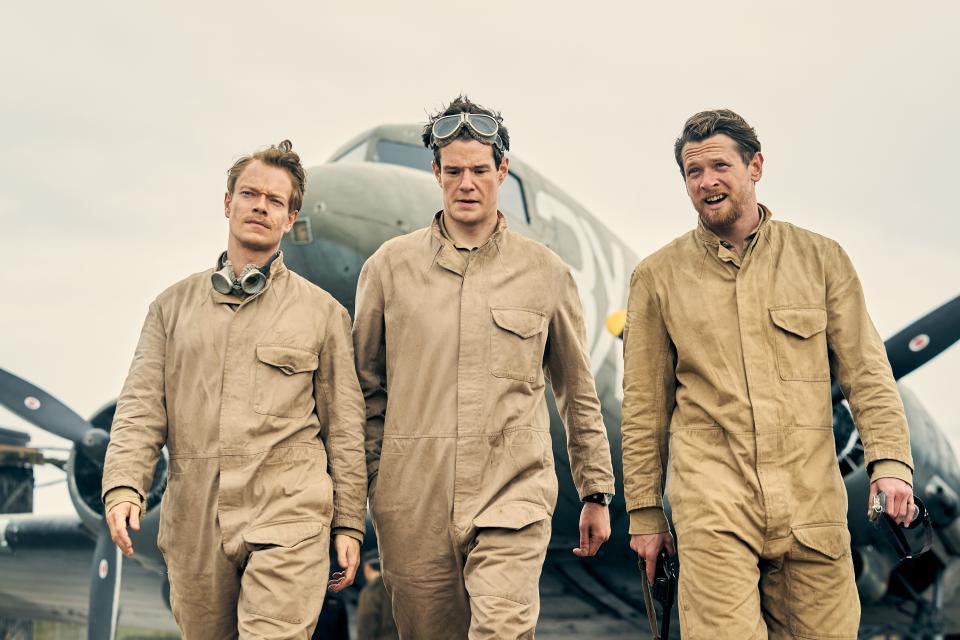
SWINDELLS: He’s fantastic and they really don’t make them like him anymore. He’s so wonderful and he’s so generous. Alfie Allan? Exactly the same. Dominic West? Also incredible.
And Tom Shankland I can’t say enough about. Despite all of that complaining we were doing in the desert, he would face it with a smile. He would face a sandstorm with a smile. He’s been with this material for a long time now so he knew the characters inside and out. I needed that because I’d come just from finishing Sex Education season 3, and I’d wrapped on a Sunday, and on the Monday I was David Stirling, so I needed someone to hold my hand. He did more than he probably should have done, and helped me. All of the crew on that job were fantastic. As much as David Stirling is a part of me, he’s as much a part of every single person on that crew, because of their contributions. That’s why I love doing this job. You all make that character, it’s not me, it’s everyone. I really believe that.
DEADLINE: It’s a collaborative art probably more so working under those kind of conditions in the desert. Did you do your parachute training out there or here in Blighty?
SWINDELLS: There was a whole system that the stunt coordinator Neil Finnighan came up with which saw a whole series of rigging and pulleys. The stunt team was fantastic out there. We did this one scene where we were in a quarry and they said: ‘We’ll pull you up fifty feet.’ They said fifty feet is high. They put these crash mats down and covered them with sand… you’re up fifty feet up in the air and you can only see dust, not crash mats, you go, ‘I wonder, if this pulley snaps am I going to break all of my legs?’ So many people in the crew were former military. Props, stunts, armorers really being on it with every little detail.
Hats off to the armorers that we had. They were working in conditions where you can start to forget things but never once did they waver or stumble at any point, so we were well taken care of. There’s a lot of guns shooting, explosions. It’s all there.
DEADLINE: Were there any snakes?
SWINDELLS: We had an amazing snake wrangler on set, an old Moroccan guy that would run and get a snake and put it in a box, put it in his pocket and then bugger off somewhere and let it go. We did have a snake in the catering once. Some cobra got in. I wasn’t sitting there that day, thank God. But a load of people suddenly started running out of the catering tent. There was a cobra in there. I don’t know what kind of cobra. Snake guy comes along and got rid of it.
But it was the camel spiders… [relishing the stricken look on this writer’s face, he continued…] It looked scary; a sandy color, with huge, big teeth on them. I don’t know why they’re called camel spiders. I hope it’s not because they eat camels. Then there’s also just camels walking around the set as well. We’re like: ‘Oh, there’s a camel walking through the set… there’s a camel.’ It was crazy.
DEADLINE: Were there other bugs?
SWINDELLS: Yeah, we had scorpions and things. You’d bang your shoes to make sure there’s no scorpions in your boots before you put them on.
Swindells is represented by Andrea Weintraub, Danielle Shebby and Joe Machota at CAA; Madeleine Dewhirst, Sian Smythe and India Sinclair at the UK’s Hamilton Hodell; attorney Julian Zajfen of Ziffren Brittenham LLP, and Public Eye Communications.
Best of Deadline
Sign up for Deadline's Newsletter. For the latest news, follow us on Facebook, Twitter, and Instagram.

